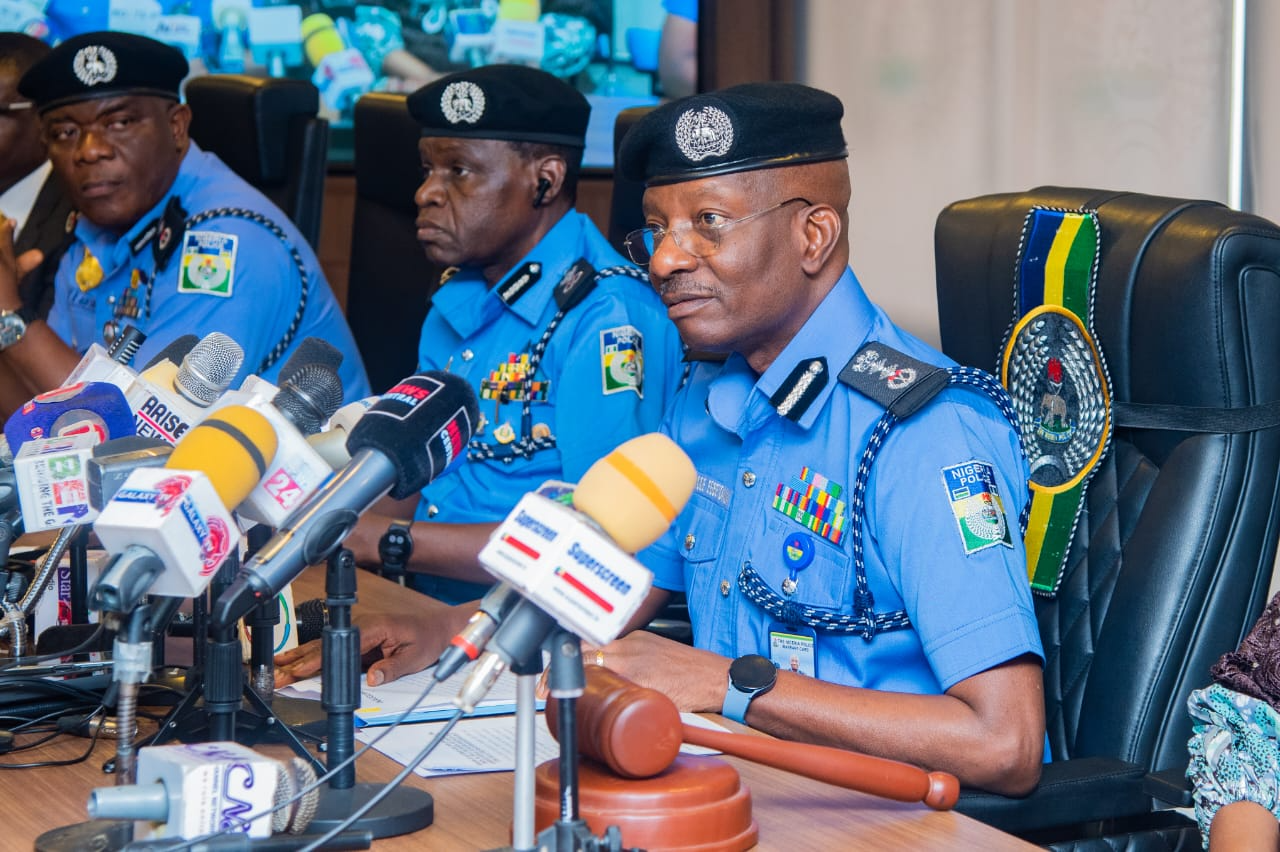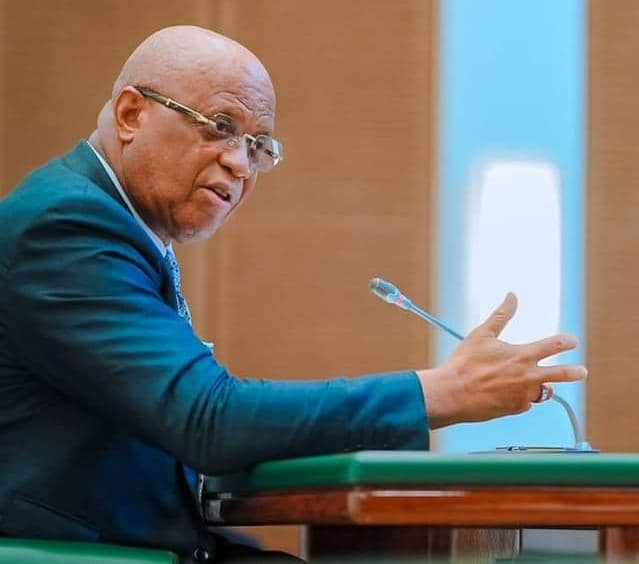The atmosphere in Abuja was calm. When the Attorney-General of the Federation and Minister of Justice, Mr. Lateef Fagbemi, SAN, entered his conference room, he passed glances as if he was checking for any atom of corruption on the faces of people waiting for him.
That was on Tuesday, February 11, 2025. It was at the inauguration of the Monitoring and Evaluation Committee (M&E) of the National Anti-Corruption Strategy (NACS) 2022-2026. Incidentally, that was the same day the Transparency International (TI) released its 2024 Corruption Perception Index (CPI) for 180 countries and territories worldwide.
 Attorney General and Minister of Justice, Lateef Fagbemi
Attorney General and Minister of Justice, Lateef FagbemiAs Fagbemi sat down to speak, his audience appeared more focused on the business of the day than TI’s report. Some of them included the Solicitor-General of the Federation and Permanent Secretary, Ministry of Justice, Mrs. Beatrice Jedy-Agba; the Director (Planning, Research and Statistics), Federal Ministry of Justice, Mrs. Victoria Ojogbane; Head of the Technical Unit on Governance and Anti-Corruption Reforms (TUGAR), Mrs. Jane Onwumere; and the anti-corruption programme manager of the EU-funded Rule of Law and Anti-corruption Programme (RoLAC-Phase II) of International IDEA, Dr. Emmanuel Uche.
Note that NACS is a policy of the Federal Government anchored on five pillars. The pillars are: prevention of corruption, public engagement, campaign for ethical re-orientation, enforcement and sanctions, and recovery and management of proceeds of crime. The first phase of the programme ran between 2017 and 2021. The second phase started in 2022 and is billed to end in 2026.
I happen to be a member of the newly inaugurated M&E Committee, comprising representatives of key Ministries, Departments and Agencies (MDAs) and Civil Society Organisations (CSOs). Essentially, our work entails, among others, to conduct quarterly monitoring visits to MDAs or as the need arises; conduct annual review of the progress of the implementation of NACS and submit reports to the NACS Ministerial Committee by January 30 each year; and prepare evaluation report on the implementation of NACS.
Explaining the import of the inauguration, Fagbemi said it was a significant step under the NACS and its Action Plan 2022-2026 for ensuring the institutionalization of accountability, transparency, and effectiveness in the public sector. The Attorney-General, who had earlier inaugurated the Inter-Ministerial Committee (IMC) of the NACS, said corruption was a formidable challenge to our national development goals. He added, “It undermines trust in public and private institutions, distorts resource allocation and incapacitates the ability of institutions to provide effective and efficient service delivery.”
Recall that Nigeria signed the United Nations Convention on Anti-Corruption (UNCAC) on December 9, 2003 and ratified it in 2004. The country also adopted the African Union Convention on Preventing and Combating Corruption (AUCPCC) in July 2003 as well as the ECOWAS Protocol on the fight against corruption in 2001. Besides, there are many laws, policies and agencies instituted to combat corruption in Nigeria. The Economic and Financial Crimes Commission (EFCC) and the Independent Corrupt Practices and other Related Offences Commission (ICPC) are some of these agencies.
These agencies have done their best in the fight against corruption. The EFCC, for instance, arrested 105 suspected syndicate of internet fraudsters last January in Abuja. The suspects include four Chinese and 101 Nigerians. Similarly, the commission arrested 792 suspected investment and internet fraudsters in Victoria Island, Lagos, in December 2024. It has succeeded in prosecuting and jailing a number of fraudsters in our midst. It has even arrested and sacked some of its operatives who are alleged to be involved in corrupt practices.
The little snag here is that the more action is taken against corruption, the more it appears to fester. In the 2024 CPI, TI ranked Nigeria 140 out of 180 countries assessed. To get to this position, the country scored 26 points out of 100, making her the 36th most corrupt country in the world. It shares this position with five other countries: Cameroon, Uganda, Madagascar, Mexico and Iraq. Each of these countries scored 26 points like Nigeria. The most corrupt country is South Sudan with 8 points, followed by Somalia with 9 points and Venezuela with 10 points. The least corrupt country is Denmark with 90 points, followed by Finland with 88 points and Singapore with 84 points. The least corrupt country in Africa is Cape Verde. It ranked 35th globally with 62 points. The scale is from 0, which means highly corrupt, to 100 which means very clean.
Nigeria’s latest performance is even an improvement compared to that of earlier years. In 2021, for instance, the country was ranked 154 out of 180 countries. In 2022, it improved marginally ranking 150 out 180 countries, but the score remained the same with the 2021 score of 24 out of 100. In 2023, again it moved up five points higher than that of 2022, ranking 145 out 180 countries and scoring 25 points, one point higher than that of the previous year. In 2024, it improved again with a score of 26 which is one point higher than that of 2023.
The major reasons for the marginal improvement, according to the Executive Director, Civil Society Legislative Advocacy Centre (CISLAC), Auwal Rafsanjani, include anti-corruption prosecutions on growing number of high-profile cases, improvement in asset recovery efforts, civil society and media advocacy in the fight against corruption, and digitization of government services which has enhanced transparency and reduced opportunities for bribery.
Should we pat ourselves on the back for this marginal improvement? Not yet. Our improved score is said to be below the sub-Saharan average of 33 points and global average of 43 points. Moreover, corruption reportedly cost the country about $18 billion annually. Illicit financial flows from Nigeria are in trillions of naira. Some of our compatriots are still harassed and embarrassed in foreign airports simply because they are Nigerians.
Besides, judicial corruption is widespread. As Rafsanjani stated, the United Nations Office on Drugs and Crime (UNODC) noted in March 2024 that 20 per cent of those who had contact with the Nigerian judiciary were confronted with requests for payment of bribes.
CISLAC also identified state capture and nepotism as a weakness in our fight against corruption. As has been observed by many concerned citizens, ethnic affiliations rather than merit drive key government appointments. Oftentimes, individuals with corruption allegations are appointed into public offices. Former President Muhammadu Buhari took it to the extreme. The incumbent President Bola Tinubu has continued on that path.
We will celebrate advancing in the war against corruption when we join the league of 10 least corrupt countries in the world. We will celebrate when our policemen and customs genuinely maintain law and order devoid of extortion; when there is zero-tolerance for oil theft, subsidy and power sector fraud. We will dance with joy when our judges no longer succumb to bribes; when our lawmakers do not convert constituency project funds to personal wealth, or demand bribes to consider a budget or during oversight functions; when ministers do not divert public funds to personal bank accounts; when the annual budget for the renovation of public officers’ houses is used to uplift our health and education sectors; when the award of trillions of naira worth of contracts follow due process; when the National Assembly passes the whistleblower protection bill; and when a civil servant’s smile does not suggest greasing of palms before service.
Above all, we will clink glasses when our elections are free, fair and credible such that vote-buying and corrupt electoral officials do not obstruct the citizens right to change a corrupt and ineffective government. All we need to achieve all these is a selfless, transparent leader who will galvanize all the arms of government to achieve our common purpose. Until then, the hard fight against corruption continues.
Re: State creation not our problem
State creation or what I term ‘Statification’ (the art of balkanizing Nigeria into smaller units as States and all it connotes) rather than be a panacea to our problems compounds our problems. Ever since the British convinced Gen Gowon in 1967 to use state creation as a means to weaken the unity of the then Eastern Region, subsequent enterprises of such form had weakened the country more than it strengthened it. The more states that are created, the more polarized the people become even people of common heritage.
As you rightly pointed out, what Nigeria direly needs is a complete overhaul/restructuring of the country and an altruistic recourse to true Federalism. But it will not be, because it will not favour the interests of our Lords who lord it over us and see state creation as a system to ensure their stranglehold on the people. It is a pity that despite the plethora of problems confronting us as a people, the band of lazy minds we have in the National Assembly in their indolence presume that once they pronounce more states into being our wonderland will berth. Shame! Gullible fellows we all are.
–Aloy Uzoekwe, Anambra State, [email protected]
Casy, I agree with you. State creation shouldn’t be our priority now even though I would like the South-East to be given at least an additional state (particularly Anioma state) to level up with other regions in the country. Ordinarily, new states ought to engender development down to the grassroots but in Nigeria, the reverse is the case. Chief Sam Mbakwe governed the old Imo state which comprised the present Imo, Abia and a half of Ebonyi states for just 51 months (4 years and 3 months). Can you believe that the development Mbakwe brought to a larger old Imo in just 51 months is still unsurpassed till today. Since 1999, smaller Imo state has produced five civilian governors. Yet, the cumulative performance of all of them does not match what Mbakwe did in a larger Imo. Mbakwe built the old Concord hotel, Adapalm, Avutu poultry, Imo Airport, Aba ceramic tiles etc which were legacy projects in just four years. Imagine what he could have done in eight years but this same Buhari truncated the second republic civilian rule. What legacy projects can be credited to these five civilian governors who have ruled a smaller Imo with bigger petro-dollar revenue accruals since 1999? Sadly, nothing tangible.
–Ifeanyi Maduako, Owerri, 0806 156 2735
Casmir, instead of the House of Reps or the National Assembly to set up a committee to find out why most of the states that were created in time past failed the viability test or are failing to become ideal states, they want to create new sets of ‘unviable states’ in addition to the ones we have now! The ulterior motive is to create new governors, new LG chairmen, new LG councillors etc just to boost their ego and create new avenues for wastages. Due to lack of ingenuity or innovative minds, the internal generated revenue of most states is abysmally low. Most states rely on federal allocations for their existence or survival! Most times, they go cap in hand to the centre for funds that develop the pockets of state officials instead of their states as intended. There are no real developments at the grassroots. It is a case of the more funds states receive, the less development we see. For good number of years now, most citizens lack good public water supply. It is the pockets of the new governors etc that will develop leaving that of the citizens empty!
–Mike, Mushin, 0816 111 4572.




 1 week ago
40
1 week ago
40







 English (US) ·
English (US) ·